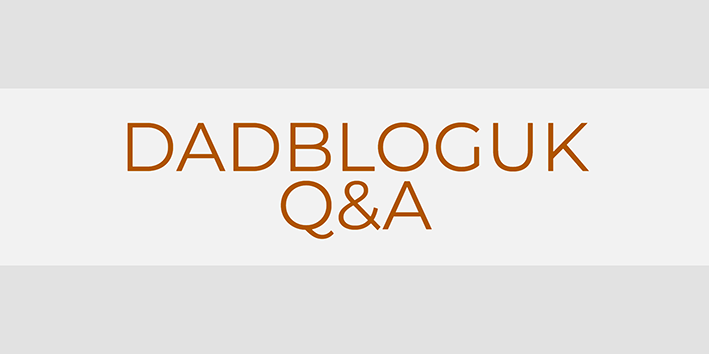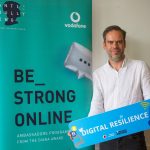A little while ago, I received an email. It was one of those messages that instantly caught my attention. It was from cyber security specialist Kaspersky. The email quoted research stating 87% of parents would fit stairgates in their home to protect their children, but only 13% use online security systems. That, however, wasn’t all.

David Emm, Principal Security Researcher at Kasperky answers my questions about online security.
Kaspersky went on to state that children are never more than three seconds away from danger online. This sounded like pretty stuff, bordering on scaremongering.
That said, as my kids get older and they get better at using tech, I can see their online safety has to be paramount. I asked Kaspersky to put someone forward to answer questions I had about the claims it was making, plus give some hints and tips for keeping kids safe online.
David Emm, Kaspersky’s Principal Security Researcher took on that task. Please have a read and see what he had to say.
First of all, David, please introduce your work at Kaspersky Lab
“I am Principal Security Researcher in Kaspersky Lab’s Global Research & Analysis Team and have been with the company since 2004. In my current role, I regularly deliver presentations on malware and other IT security threats at exhibitions and events, highlighting what organisations and consumers can do to stay safe online. I also provide comment to broadcast and print media on the ever-changing cyber-security and threat landscape.
“I have worked in the anti-malware industry since 1990 in a variety of roles, including that of Senior Technology Consultant at Dr Solomon’s Software, and Systems Engineer and Product Manager at McAfee. I have a strong interest in malware, ID theft and the human aspects of security.
You have said that children are never more than three seconds away from danger online. If you’ll forgive me for saying so, that does sound a bit like scaremongering. What dangers can children face in that length of time?
“It’s not meant to be alarmist. Rather, it’s intended to highlight the fact that online dangers are close-by; and if they’re not mitigated, our children are at risk. We take this for granted in the real world and put in place measures to keep them safe for example: Stairgates, short flexes on electrical devices, keeping dangerous substances out of reach, etc. Unfortunately, knowledge of online threats, and how to safeguard our children, are not as obvious.
“Our research shows that children are on average spending over four hours a week watching video content online and are only ever a few seconds away from content aimed at a more mature audience, featuring violence, guns and nudity. Children are fortunate in that the technology available to them enables them to access entertainment or information from such a young age.
“While some may think it sounds like scaremongering, we want to ensure that this freedom to explore the world can continue without sacrificing children’s emotional safety and making parents aware is a step towards achieving this. The good news is that having parental controls in place and reviewing the default settings per app are two very small steps that we, as parents, can take.”

What are the biggest dangers that children are likely to face? Is it cyberbullying, fraud, grooming?
“Cyberbullying is a very real, regularly-discussed topic, and the surge in online grooming online marks a worrying development in our society. Everyone has a right to use social media networks without fear of abuse or inappropriate behaviour, but we still see news of young people being pushed to self-harm or suicide due to trolling or abuse, demonstrating that more needs to be done by social media companies like Twitter and Facebook to protect young people especially. These sites need to be aware of the dangers that these networks present to individuals. These platforms should closely monitor communication channels, using keyword filtering to flag potentially problematic messages. Any and all flags, whether raised automatically by these systems or by social media members, should be checked quickly and dealt with appropriately.
As parents, we also need to make sure that our children don’t put themselves at risk by over-sharing personal information; information that could be used to target them. As in the real world, they may not see the danger, so we have anticipate it and keep them free from harm. Technology can be a great help here, blocking the sharing of specified personal details such as address, telephone number, etc. It’s important that we explain to our children that there is no such thing as a ‘delete’ button on the internet – anything they post could last forever.”
Elaborating on the above, Kaspersky has said that psychological harm is a big threat to children online. Can you expand on this please?
“Children can be traumatised by inappropriate content, or by things that people say to them. It’s much easier to identify, and protect children from, risks of physical harm, but emotional harm should be equally prioritised by parents. With results from The Good Childhood Report 2017 showing that young people’s happiness is at its lowest level since 2017, it’s clear that we need to be doing more to protect children from online content that could cause emotional harm.”
How do online safety issues change as children get older? Are youngsters more likely to watch an inappropriate video while teenagers go on a spending spree with their parents’ credit cards?
“Threats evolve as children get older, from viewing potentially disturbing content whilst using household tablets and smart devices as a young child, to becoming victims of cyberbullying as they get a bit older. In addition, older children need greater scope to explore the world around them, as they become more independent.
“Parents should establish an open dialogue with their children from a very young age, as soon as they start to interact with technology. This is the foundation of online security. This means sharing their online experience when they are very young, taking the opportunities to explain why passwords are important, why they shouldn’t talk to strangers, why it’s dangerous to share personal information, etc.
“If we talk to them about potential risks from a young age, they are more likely to come to us to discuss things that make them feel uncomfortable or upset them. Technology also makes it possible to help define a framework for their Internet use at different ages – for example, limiting their internet usage, limit the time spent in these online worlds, and protecting any devices that they use.”
Kaspersky has made an interesting comparison, saying 87% of parents will fit stairgates in their home but only 13% use online security to protect their children. What should parents be doing to protect their children?
- Supervision; this may seem obvious, but parents should supervise a child’s internet use, and encourage them to visit and stay on websites they’re both familiar with. If parents have any concerns, they should look at their browsing history. Guardians should also know about any password-protected sites children may be accessing, and ask them to share login details just in case.
- Be open; parents should encourage children to be open about what they are doing online, and who they are socialising with. It’s important for families to promote a culture of safety within the home and talk about the possible dangers that exist.
- Protect your family; parents should use parental controls to block access to sites they don’t want their child looking at, as part of online security protection. It’s an easy way to avoid disaster. It’s a good idea to review the default settings on each app that a child uses, to ensure that the camera or microphone, for example, aren’t needlessly turned on, as these can pose a threat.
How about screen time, should mums, dads and carers be doing more to limit this?
“Recently, it was found that children are spending longer at home each day, and are spending this time alone on their smartphones. While time in front of a screen isn’t necessarily harmful per se, it’s important that we monitor what our children are doing. By supervising children whilst they are online, and having open conversations about their online use, parents can ensure their children are protected from harm – and this recent research demonstrates how important it is for parents to do so.”






